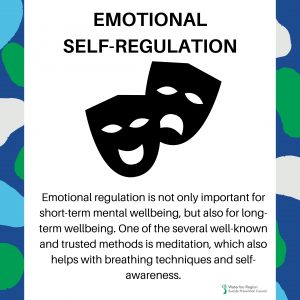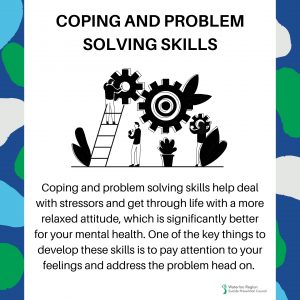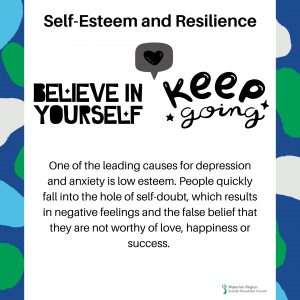This week in our Resilience & Protective Factors series, we’re looking at Psychological factors. Psychological factors might be what most of us typically think of when we think of mental health and individual wellness. We’ll look at some evidence-based characteristics that may lower the likelihood of negative mental health outcomes. The specific factors we’ll look at include emotional self-regulation, coping and problem solving skills, and self-esteem and resilience.
1: Emotional Self-Regulation

Emotional self-regulation involves the ability to recognize and regulate or control your reactions to situations around you. While you often cannot control your situation, you can control your reaction or interpretation of a situation, and therefore how that situation may impact you. Emotional self-regulation includes an ability to self-soothe or calm and to find appropriate coping techniques for a situation. Emotional regulation is not only important for short-term mental wellbeing, but also for long-term wellbeing. While it comes to some people naturally, it is also a skill that can also be learned and improved. One well-known and trusted methods for practicing emotional self-awareness and self-regulation is meditation, which has also been researched it’s other potential physical and mental health benefits (source).
2: Coping and Problem Solving Skills

Closely linked to emotional self-regulation, coping and problem solving skills can help deal with stressors and develop resilience in the face of adversity, leading to improved mental health outcomes. One important element in developing these skills is to pay attention to, recognize, and acknowledge your feelings. While it might feel tempting at times to push down or just ignore a feeling or avoid a problem, this may be only temporarily useful. When faced with a stressful situation, emotional self-regulation can be used to cope with difficult feelings when the situation may not be within your control. However if a situation or an element of a situation is within your control, coping and problem solving skills help to find a solution. Brainstorming, thinking about similar situations you’ve experiencing, and asking others for help can be some ways to find and implement a solution. Sometimes, even finding small things you can control in a larger situation that you cannot won’t entirely solve a problem but can make that problem more bearable and can lead to improved mental health (source).
3: Self Esteem

Low self-esteem has been long thought of and researched as a cause of depression and other mental health struggles. When experiencing low self-esteem, you may quickly fall into a hole of self-doubt resulting in negative feelings and a false belief that you are not worthy of love, happiness or success. More recently, self-esteem has been criticized and an alternative approach named Self-Compassion by Kristin Neff has been explored. Learning to love ourselves, believe in ourselves, and show ourselves compassion helps us to achieve what our negative self-talk might tell us we cannot do. Though it’s not easy, challenging these negative thoughts and replacing them with compassionate ones is so important for a healthy mindset and for positive mental wellness (source).
Local Community resources:
There are many local community resources that work to support individuals in developing the psychological protective and resilience factors listed here. You can some of these community resources in our Maintaining Wellness During COVID-19 post, as well as within the videos we recently shared for our World Suicide Prevention Day 2020 Virtual Wellness Fair.


